How to Recognise and Manage Stress with naturopathic nutrition

Stress is an inevitable part of life, especially for the ‘sandwich’ generation. We're still caring for our kids and also caring for our elders but unlike women before us we’re also working, running businesses, busy social lives, endless ‘extra activities’ the list goes on.
No wonder we’re at the bottom of our own list and feeling stressed.
The term stressed seems to be overused. I know I’m guilty of saying “I’m stressed about which restaurant to pick, which movie to watch…” all the other ‘first world’ problems. But the term is all too real.
Stress’s impact on our health can vary greatly depending on how we manage it.
And that’s where I come in. In this blog you’ll explore the intricate relationship between nutrition and stress management, uncovering how the foods we eat can influence our ability to recognise and cope with stress effectively. From subtle physical symptoms to hormonal imbalances and emotional resilience, we'll delve into the multifaceted ways in which nutrition plays a crucial role in our overall well-being.
As always there are ‘none nutritional’ things here too, remember my approach as a naturopathic nutritionist is a whole approach not just what you eat which is so often linked to nutrition.
Step 1- Recognise the physical manifestations of stress.
Beyond the typical feelings of fatigue, stress can manifest in a myriad of physical symptoms that are often overlooked. From headaches and muscle tension to digestive disturbances and changes in appetite, these subtle signs may be indicative of underlying stressors. Recognising these physical manifestations is essential for addressing stress at its root and preventing further health complications. So often you think you’re just tired or achy or experiencing brain fog because of your age, that’s not the case and it doesn’t have to be that way.
Step 2 Consider your hormonal balance.
Our hormonal system plays a significant role in how we perceive and respond to stress. Chronic stress can disrupt the delicate balance of hormones in the body, making symptoms of menopause and hormonal imbalances much worse. By prioritising nutrient-dense foods that support hormonal health. Think along the lines of leafy greens, fatty fish, and whole grains and some simple swaps to include these you can mitigate the effects of stress on your hormonal system and promote greater resilience.
Gut health and the gut-brain axis.
Emerging research has highlighted the profound connection between our gut health and mental well-being, known as the gut-brain axis. Chronic stress can disrupt the balance of gut bacteria, leading to symptoms such as bloating, indigestion, and food cravings. Incorporating probiotic-rich foods like yoghurt, kefir, and sauerkraut into our diet can support a healthy gut microbiome and enhance our ability to cope with stress.
Step 3- Work on your emotional resilience and nutritional support.
In addition to physical symptoms, stress can take a toll on our emotional well-being, leading to feelings of anxiety, irritability, and detachment. Nutrient-dense foods rich in omega-3 fatty acids, antioxidants, and B vitamins can help support our mood and cognitive function, promoting greater emotional resilience in the face of stress. By nourishing our bodies with whole, unprocessed foods, we can cultivate a greater sense of balance and vitality.
Step 4- Note down some practical strategies for stress management.
Alongside dietary interventions, there are many practical strategies we can employ to manage stress effectively. These may include mindfulness practices such as meditation and deep breathing exercises, regular physical activity, and adequate sleep. Additionally, seeking support from friends, family, or a qualified healthcare professional can provide valuable guidance and encouragement on our journey to stress management. These are also something we can look at when you work with me.
So, as we navigate the complexities of modern life, it's essential to recognise the role that nutrition plays in managing stress and promoting overall well-being.
By paying attention to the subtle signs of stress and nourishing our bodies with nutrient-dense foods, we can empower ourselves to lead healthier, more balanced lives.
Remember, small changes can make a big difference. Just start by listening to your body and honouring its needs.
Is it time for you to embrace the journey to greater resilience, vitality and renewed energy start with a free health review and start to make a change.
Book your free health review here.
